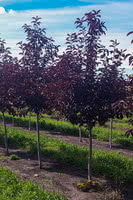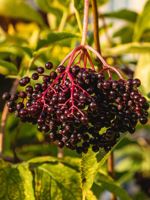Mon-Fri 9am - 5pm Mountain time
Robert Chokecherry vs Bob Gordon Elderberry
Prunus virginiana Robert
Sambucus canadensis Bob Gordon
NOT AVAILABLE THIS SEASON - MIGHT RETURN
Developed in Barrhead, Alberta, the Robert Chokecherry produces very large berries (comparable to the size of grapes) with good yield.
The berries can be used for wine, jams, jellies and fresh picking, making it one of the sweeter chokecherries. Rich, red foliage make it a striking landscape addition.
Bob Gordon Elderberry is a Black Elderberry cultivar that produces berries that are larger and sweeter than other varieties, making it one of the top cultivars. It produces large clusters of white flowers that turn into large clusters of dark purple to black berries. The berries are well-suited for baked goods, jams, jellies, and syrups. It was selected from the wild in Missouri.
The large berry clusters that the Bob Gordon Elderberry produces will often end up hanging downward. This makes it more difficult for birds to feed on the berries. If birds are a concern, this might be the right berry for you.
Black Elderberries are considered to be partially self-pollinating. So while they will still produce some berries without cross-pollination, planting with another variety will increase yields. Consider planting with Black Elderberry or Ranch Elderberry.
Warning: the seeds, stems, leaves, roots, and uncooked berries are toxic to humans when eaten in quantity. Berries should be cooked to make them safe for human consumption.
Robert Chokecherry Quick Facts
Bob Gordon Elderberry Quick Facts
Toxicity: Toxic to animals with segmented stomachs (horses, cattle, deer moose, etc.)
Toxicity: leaves, stems, and uncooked berries are poisonous to humans

